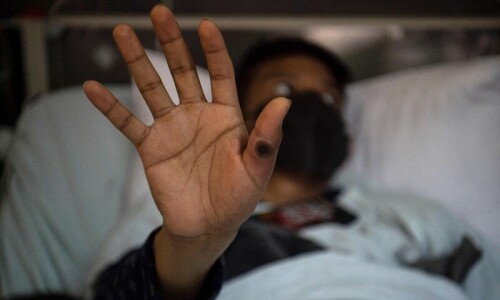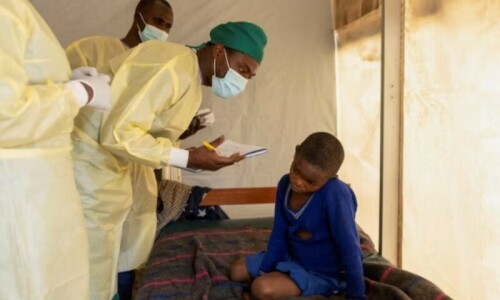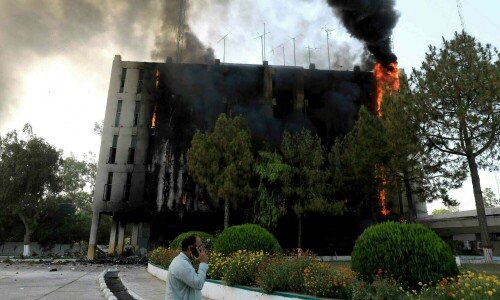PESHAWAR: Health department has put hospitals and other relevant facilities in the province on alert after reporting a case of mpox, previously known as monkey pox, according to a senior official.
The director of public health at provincial directorate-general health services, Dr Irshad Ali Roghani told Dawn that the zoonotic infection was detected in a 34-year-old male resident of Lower Dir district on Wednesday. The patient, having a travel history to Middle East, had been isolated, he added.
He said that the patient visited Khyber Teaching Hospital, Peshawar, for some skin-related issues where he was advised mpox test that emerged positive at Public Health Reference Laboratory (PHRL) of Khyber Medical University.
Dr Irshad said that specimen had also been sent for genetic sequencing to National Institute of Health Islamabad. “The department has strengthened surveillance network and efforts are afoot to screen people among close contacts of the infected person,” he added.
Patient from Dir has a travel history to Middle East
He said that an advisory was sent to medical superintendents of hospitals and district health officers regarding collection, storage and transportation of samples to PHRL. Hospitals were directed to ensure the standard operating procedure to ensure accurate diagnosis, he added.
Dr Irshad said that hospitals were also informed about the symptoms of the disease in order to test suspected patients.
Meanwhile, PHRL has also issued guidelines to hospitals, saying that mpox is transmitted from animals to humans with incubation period of three to 17 days after inoculation.
It begins with a combination fever, headache, muscle aches, back pain, swollen lymph nodes, chills and exhaustion. After initial symptoms, the patient develops a rash, often beginning on the face and then spreading to other parts of the body including palms and soles.
The rash evolves from macules (flat lesions) to papules (raised lesions), vesicles (fluid-filled lesions), pustules (pus-filled lesions), and finally crusts. The lesions eventually fall off.
The disease is transmittable through direct contact with blood, bodily fluids or cutaneous or mucosal lesions of infected patients and indirect contact through contaminated materials such as bedding.
It has no specific treatment. The disease is self-limiting.
The treatment of the disease is primarily supportive, focusing on alleviating symptoms. Antiviral drugs like Tecovirimat (TPOXX) have been approved for its treatment in some countries. However, antiviral treatment is generally not prescribed in most cases.
The infection can be more aggressive in cases of patients with comorbidities such as immunodeficiency state including HIV/Aids.
To prevent the spread of mpox, World Health Organisation recommends avoiding close contact with suspected or confirmed cases, practicing hand hygiene and using personal protective equipment when caring for patients.
Vaccination is a key preventive tool, particularly for high-risk groups. The smallpox vaccine has been approved for mpox prevention in some regions. However, global vaccine availability is limited.
According to the advisory, healthcare workers should follow strict infection prevention protocols including use of appropriate personal protective equipment and isolation of patients. Rapid identification and isolation of cases, contact tracing and public education are essential components of outbreak control, it adds.
It says that physicians should provide maximum clinical information, especially possible contact history, date of onset of symptoms and sample collection, when requesting for laboratory testing. Clinical summary must accompany the sample and packaged in a separate plastic zipper bag in the second layer of triple package, it adds.
Published in Dawn, August 16th, 2024















































